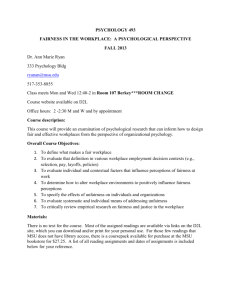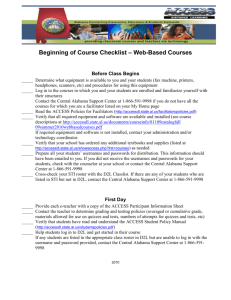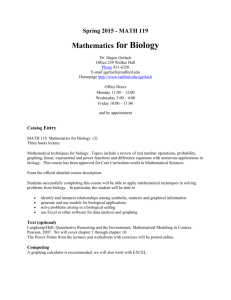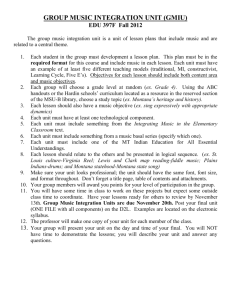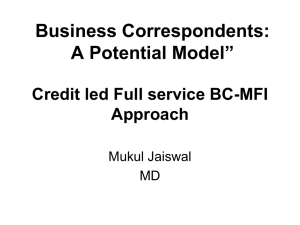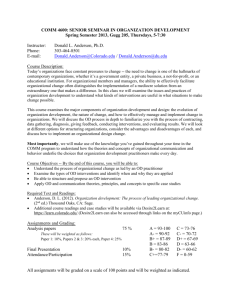fairness in the workplace: a psychological perspective
advertisement
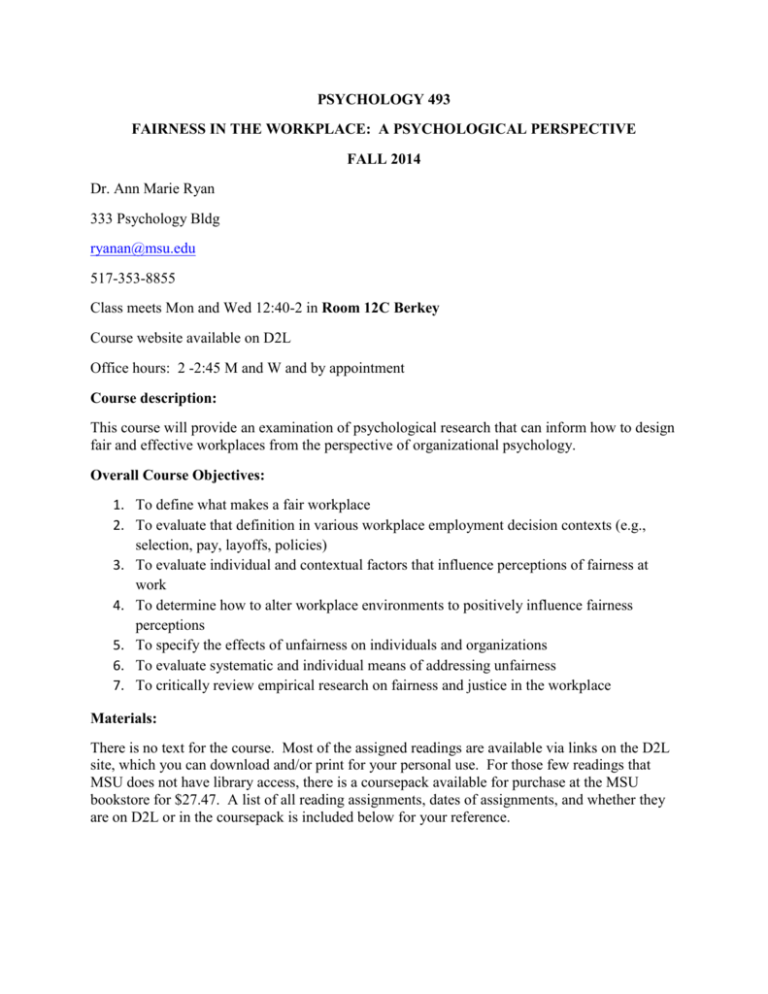
PSYCHOLOGY 493 FAIRNESS IN THE WORKPLACE: A PSYCHOLOGICAL PERSPECTIVE FALL 2014 Dr. Ann Marie Ryan 333 Psychology Bldg ryanan@msu.edu 517-353-8855 Class meets Mon and Wed 12:40-2 in Room 12C Berkey Course website available on D2L Office hours: 2 -2:45 M and W and by appointment Course description: This course will provide an examination of psychological research that can inform how to design fair and effective workplaces from the perspective of organizational psychology. Overall Course Objectives: 1. To define what makes a fair workplace 2. To evaluate that definition in various workplace employment decision contexts (e.g., selection, pay, layoffs, policies) 3. To evaluate individual and contextual factors that influence perceptions of fairness at work 4. To determine how to alter workplace environments to positively influence fairness perceptions 5. To specify the effects of unfairness on individuals and organizations 6. To evaluate systematic and individual means of addressing unfairness 7. To critically review empirical research on fairness and justice in the workplace Materials: There is no text for the course. Most of the assigned readings are available via links on the D2L site, which you can download and/or print for your personal use. For those few readings that MSU does not have library access, there is a coursepack available for purchase at the MSU bookstore for $27.47. A list of all reading assignments, dates of assignments, and whether they are on D2L or in the coursepack is included below for your reference. Attendance Policy Attendance is expected at classes. This is an upper level class and thus it is expected that you will be engaged in discussion and interactions with classmates. In-class participation is part of one’s grade, and in-class exercises will be turned in towards a grade. Grading criteria: Final grades will be based on the following: Points Justice project (multipart) 170 Indepth assignments (5 at 30 points each) 150 Prework short assignments (18 for 10 pts each) 180 In class participation (up to 20 at 5 points each) 100 Total 600 Grade cutoffs 540 points and above 4.0 510-539 points 3.5 480-509 3.0 450-479 2.5 420-449 2.0 390-419 1.5 360-389 1.0 Below 360 0.0 In class participation points. Calculation of credit for class participation takes into account the likelihood that you may miss several classes due to illness or emergencies. There are participation opportunities most classes during term; while there are 27 opportunities you need only get 20 of those to get full points (i.e., missing a couple of classes for legitimate reasons will not affect your grade). Points are given for participating and completing work. To be clear, if you miss class, this scale is very generous in allowing for such events. It also means that there is no value in attempting to talk your way into more points at the end of the term. Extra credit There are no extra credit opportunities –there are multiple opportunities for you to improve your grade. Late or missed assignments. Handing in assignments later than the start of class on the date due is not acceptable. Late assignments ARE NOT ACCEPTED. Note that the D2L dropbox for assignments automatically stops taking submissions within minutes of the start of class on dates when assignments are due – do NOT wait until the last minute to submit the assignment. Grade posting Grades will be posted in a timely fashion. It is your responsibility to check the posted grades throughout the term for accuracy. Academic Honesty: Article 2.3.3 of the Academic Freedom Report states: “The student shares with the faculty the responsibility for maintaining the integrity of scholarship, grades, and professional standards.” In addition, the psychology department adheres to the policies on academic honesty specified in General Student Regulation 1.0, Protection of Scholarship and Grades; the all-University Policy on Integrity of Scholarship and Grades; and Ordinance 17.00, Examinations. (See Spartan Life: Student Handbook and Resource Guide and/or the MSU Web site www.msu.edu.) Therefore, you are expected to complete all course assignments without assistance from any source. You are expected to develop original work for this course; therefore, you may not submit course work you completed for another course to satisfy the requirements for this course. Students who violate MSU rules may receive a penalty grade, including but not limited to a failing grade on the assignment or in the course. Specific to this course, plagiarism of an assignment results in a zero for that assignment. Attempting to gain participation points for someone is not in attendance in class (handing in work with the name on it of someone not in attendance) or in other ways misrepresenting completion of the participation requirement results in a 0.0 final course grade (i.e., failure in the class, not just on the requirement points). Instructor Availability: While I do have set office hours, I am available to meet with students at other times by appointment. However, my schedule is a full one and so dropping by may not be the best strategy – please email to schedule appointments. I do check email frequently. Classroom Rules of Conduct Cell phones must be turned off before class starts and put away. The course is structured to encourage discussion and interaction – please treat other members of the class with courtesy and respect. If you are disruptive (e.g., talking when others have the floor, making inappropriate remarks, interfering with others’ learning), you will be asked to leave the class. Texting, emailing, game playing, and web surfing during class are counterproductive to learning, lessen your capacity to engage with those around you, and can be rude. Leave the outside world outside of class and be fully present. I reserve the right to confiscate for the duration of class any device that I feel is affecting my ability to teach effectively regardless of whether you think it is not distracting to you. If for some reason you must arrive late or leave early (e.g., illness, car trouble), please take a seat near the door and minimize disruption of others with your arrival/departure. While I do not mind non-alcoholic beverages in class, please refrain from eating unless you have enough to share with everyone. Online D2L expectations D2L is still a new system at MSU so please be patient with any snags or missteps. Some assignments will require you to post to a public discussion board your thoughts and ideas. While I encourage you to be yourself in your expressions, I also expect courtesy and respect for others. Please refrain from language that others might find offensive. There are topics we will discuss where individuals may have very different opinions and views – please express your dissenting viewpoint diplomatically. Recording As members of a learning community, students are expected to respect the intellectual property of course instructors. All course materials presented to students are subject to the following conditions of use: 1. Students may record lectures/classroom activities and use the recordings for their own course-related purposes. 2. Students may share the recordings for others enrolled in this specific course section. Sharing is limited to using the recordings only for course-related purposes 3. Students may not post the recordings or any other course materials online or distribute them to anyone not enrolled in this section of the class without the advance written permission of the course instructor and, if applicable, any students whose voice or image is included in the recordings. 4. Any student violating the conditions described above may face academic disciplinary sanctions. Accommodations If you have a disability that will require accommodations, please see me the first week of class. If you will miss class for a religious observance, let me know in advance. Emergency Procedures If an emergency should occur that would require the cancellation of class, I will send an email via D2L. While an emergency occurring during class is unlikely, please take time the first day to think through your emergency plans for such events (e.g., know at least two exits from the building). Tips for Success This is not a class of lecturing – class time will be spent on integration with the assumption that you are coming to class prepared. Some hints for being successful: Read any assigned BEFORE class so that you can discuss them in class Complete the short prework assignments – we discuss them in class Ask questions. Share your own experiences. Be engaged– you get more if you give more. Tentative course schedule (this schedule is subject to change) A: 30 point assignment; P: short prework (10 points); CP means coursepack Date Topic Assignments Readings August 27 Overview ------Sept 3 What is Fair? A1 interview Cropanzano et al Sept 8 Org Justice Theory: components P1 Brockner Kim & Mauborgne Sept 10 Org Justice Theory: antecedents A2 social media Bies & Tripp(CP) Sept 15 Org Justice Theory: outcomes P2 Greenberg 1988 Bowen et al Sept 17 Org Justice Theory: moderators P3 Bobocel Greenberg 1994 Sept 22 Legal definitions of fairness A3 (EEO) Von Bergen Sept 24 Incivility/harassment/mistreatment P4 Porath and Pearson Sept 29 Fairness and voice P5 Potter Guest lecture: Danielle King Oct 1 Fairness and health P6 Wellness audio link Guest lecture: Dr. Daisy Chang Singer Oct 6 Fairness in hiring practices A4 criminal ------bgd Oct 8 Fairness in hiring practices P7 Davidson Oct 13 Fairness in pay and recognition Project problem PlanetMoney podcast statement Tugend Sandburn Oct 15 Fairness in pay and recognition P8 Greenberg Yaccino & Cooper Kimble AAP Oct 20 Research article discussion/project A5 article -------progress discussion summary Oct 22 Fairness in performance P9 Repa (CP) management/termination Oct 27 Fairness: layoffs and mergers P10 Melkonian et al Oct 29 Policies on when, where & how Project lit Greenhouse much work review (noncompete) Johnston Moore Nov 3 Policies on when, where & how P11 Grandy (CP) much work Kantor Podcast scheduling Singer Nov 5 Technology/ monitoring policies P12 Podcast monitoring Nov 10 Performance Monitoring & Behavior policies Project application Konovsky & Cropanzano (CP) Nov 12 Appearance & Behavior policies P13 Nov 17 Accommodations and exceptions P14 Nov 19 Preferences P15 Nov 24 Addressing unfairness: managers Nov 26 Addressing unfairness: systems approaches Project integration P16 Dec 1 Addressing unfairness: individual “victims” Emerging issues Final meeting 12:45-2:45 Dec 3 Dec 9 (Tues) P17 P18 Justice projects Mainiero & Jones Sanburn Kimmel Colella Kelly Podcast on pregnancy Clark Podcast on networks Folger & Cropanzano, p133-156 only (CP) Folger & Cropanzano, p156172 only (CP) Truxillo Zitek et al. To be deterrmined LIST OF READINGS (notes whether on D2L or in coursepack) 9/3: Cropanzano, R., Bowen, DE, Gilliland, WS (2007) The management of organizational justice. Academy of Management Perspectives, 301-48 (link on D2L) 9/8: Brockner, J. (2006). Why is it so hard to be fair? Harvard Business Review, (link on D2L) 9/8: Kim, WC & Mauborgne, R 1997. Fair process: managing in the knowledge economy, Harvard Business Review. (link on D2L) 9/10: Bies, R.J. & Tripp, T.M. (2005). Badmouthing the company: bitter employee or concerned corporate citizen? In R.E. Kidwell & C.L. Martin (Eds.) Managing organizational deviance. Thousand Oaks, CA: Sage Publications p 97-108 (in coursepack) 9/15: Greenberg, J. (1988). Equity and workplace status: A field experiment. Journal of Applied Psychology, 73(4), 606-613. (link on D2L) 9/15: Bowen, DE, Gilliland SW & Folger R (1999). HRM and service fairness: how being fair with employees spills over to customers. Organizational Dynamics, 27,p7-23. (link on D2L) 9/17: Greenberg, J. (1994). Using socially fair treatment to promote acceptance of a work site smoking ban. Journal of Applied Psychology, 79(2), 288. (link on D2L) 9/17: Bobocel, D. R. (2013). Coping With Unfair Events Constructively or Destructively: The Effects of Overall Justice and Self-Other Orientation. Journal of Applied Psychology. (link on D2L) 9/22: Von Bergen, CW (2008). The times they are a-changing: Family responsibilities discrimination and the EEOC Employ Respons Rights J 20: 177-194. (link on D2L) 9/24: Porath, C.L., Pearson, C.M.. "The Price of Incivility." Harvard Business Review Jan/F (2013). (link on D2L) 9/29: Potter, P. W. (2006). Procedural justice, voice effects and sham: Examining the decision maker from a research context perspective. Journal of Organizational Culture, Communication, and Conflict, 10(2), 61-76. (link on D2L) 10/1 Singer, N (2013). Rules sought for workplace wellness questionnaires. New York Times, September 24. (link on D2L) 10/8: Davison, HK, Marasit CC Hamilton RH & Bing MN (2012) To screen or not to screen? Using the internet for selection decisions. Employee Rights and Responsibilities Journal, 24, 121. (link on D2L) 10/13: Tugend, A. (2014). Secrecy about salaries may be on the wane. New York Times, August 22 (link on D2L) 10/13: Sandburn, J. (2012). Hard Labor. Time.com, 179 (Link on D2L) 10/15: Greenberg, J. (1990). Employee theft as a reaction to underpayment inequity: The hidden cost of pay cuts. Journal of Applied Psychology, 75(5), 561. (link on D2L) 10/15: Yaccino, S. & Cooper, M. (2013). Cries of betrayal as Detroit plans to cut pensions. The New York Times, July 21. (link on D2L) 10/15: Kimble, J. (2013). Fairness: get a tattoo of the company you work for, get a 15 percent raise. www.complex.com (link on D2L) 10/15 AAP (2013). When workplace rewards don’t work. St. Louis Post-Dispatch. 10/22: Repa, B.K. (2010) Your Rights in the workplace. NOLO. Ch 9 Losing or Leaving a Job. P 324-335 only. (in coursepack) 10/27: Melkonian T Monin P & Noorderhaven NG 2011 Distributive justice, procedural justice, exemplarity and employees’ willingness to cooperate in M&A integration processes: an analysis of the Air France-KLM merger, Human Resource Management, 50, 809-837. (link on D2L) 10/29: Moore, M. (2011, 05). Jimmy john's workers 'quarantine' sandwich shop. Industrial Worker. (link on D2L) 10/29 Greenhouse, S. (2014). Non-compete clauses increasingly pop up in an array of jobs. New York Times, June 8. (Link on D2L) 10/29 Johnston, K. (2013). Unlimited time off? No thanks some workers say. Boston Globe. August 21. (link on D2L) 11/3: Grandey, A.A. Family-friendly policies: organizational justice perceptions of need-based allocations. In R. Cropanzano (Ed.). Justice in the workplace: from theory to practice, Volume 2. Mahwah NJ: Lawrence Erlbaum. P151-168 only. (in coursepack) 11/3 Kantor, J. (2014). Working anything but 9 to 5. New York Times, August 13. (link on D2L) 11/3 Singer, M. (2014). In the sharing economy, workers find both freedom and uncertainty. New York Times, August 16. (link on D2L) 11/10: Konovsky, M.A. & Cropanzano, R. (1993). Justice considerations in employee drug testing. In R. Cropanzano (Eds.). Justice in the workplace: approaching fairness in human resource management. Hillsdale, NJ: Lawrence Erlbaum.p 181-188 only. (in coursepack) 11/12 Kimmel, M (2013). Fired for being beautiful. NY Times. (link on D2L) 11/12 Sanburn, J. (2013). Too big to cocktail? Judge upholds weight discrimination in the workplace. Time. (link on D2L) 11/12 Mainiero, Lisa, and Kevin Jones. (2013). "Sexual Harassment Versus Workplace Romance: Social Media Spillover and Textual Harassment in the Workplace." The Academy of Management Perspectives,. 27, p187-203. (link on D2L) 11/17: Colella, A 2001 Coworker distributive fairness judgments of the workplace accommodation of employees with disabilities, Academy of Management Review, 26, 100-116. (link on D2L) 11/17 Kelly, EP 2008 Accommodating religious expression in the workplace. Employee Responsibilities and Rights Journal, 20, 45-56. (link on D2L) 11/19 Clark, N. (2010). Getting women into boardrooms by law. New York Times, January 27. (link on D2L) 11/24 and 11/26: Folger, R. & Cropanzano, R. (1998). Ch 6: Organizational justice and conflict management: social accounts, third parties, and grievance systems. In Organizational Justice and Human Resource Management. (in coursepack) Read 133-156 on 11/24 Read 156-172 on 11/26 11/26: Truxillo, D. M., Bauer, T. N., & Campion, M. A. (2009). Organizational justice interventions: Practicalities, concerns, and potential. Industrial and Organizational Psychology: Perspectives on Science and Practice, 2(2), 211-214. (link on D2L) 12/1 Zitek, E M.; Jordan, A H.; Monin, B; Leach, F R. (2010). Victim entitlement to behave selfishly. Journal of Personality and Social Psychology, 98, 245-255.

